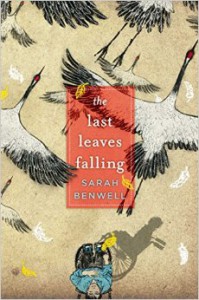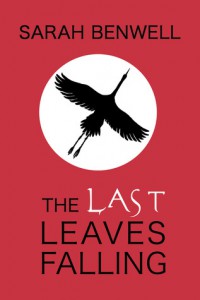
“Last Leaves Falling” (Simon & Schuster 2015) by Sarah Benwell is the story of Sora who has ALS, the neurodegenerative disease better known as Lou Gehrig’s disease.
I have a friend who has ALS and another who died of it. Statistically, death occurs within 2-5 years of diagnosis. There is no cure.
It’s unusual for a young person to have ALS, but, tragically enough, it happens. Sora, 17 years old, lives in Tokyo with his mother. Because his school cannot accommodate wheelchairs, Sora is homebound while his mother goes off to work. He would like to have been a scholar and professor. This will never happen.
Sora reads poems of the Samurai—Japanese warriors—to find insights about dying. Death is “The final thing, a gate, closed on the way out.” Or “Death is death.” Sora would like to accept his fate—like a Samurai poet. But he’s afraid. And alone.

He lurks online in a chat room as SamuraiMan. He bolsters his nerves and begins “chatting.” The other teens discuss love, studies, and balancing their parents’ wishes with their own. Sora envies them. He meets MonkEC, a charming young artist, whose parents want her to study medicine at Harvard. She wants to be an anime artist.
Instead of revealing his ALS online, Sora tries to fit in.
In a moment of frustration he screams (“AAAAAAA”) in the chat room then logs off. He assumes this is social suicide. But when he eventually re-enters the chat room, NoFaceBoy asks how he is doing. His virtual friends are concerned. They understand that life can be frustrating, but they don’t know why SamuraiMan is frustrated.
Sora’s mother asks him to invite his online friends over. He does. They know nothing about his ALS or his wheelchair until they arrive at his house. At first they’re shocked, but they come around. The three go out together. Sora experiences teenage existence and the three forge a strong bond.
The title surely refers to O. Henry’s story, “The Last Leaf,” where the young woman with pneumonia says she will die when the last leaf falls from the vine outside her window. During a storm her neighbor paints a leaf on the brick wall. The young woman sees the leaf, recovers, but the artist-neighbor contracts pneumonia and dies. The two stories do not parallel each other, but share themes—friendship, death, artistry—and the image of the last leaf.
Benwell writes sensitively and realistically about Sora’s fear of inevitable death, in contemporary society—but it is Japanese culture so that new worlds might be opened to the reader. An adult reader might develop a deeper understanding of chat rooms, as I did. Besides being well-written and suspenseful, it’s also a fast read due to some pages resembling a chat room format with plenty of white space on the page.
Patricia Hruby Powell’s book Josephine: The Dazzling Life of Josephine Baker was awarded a Sibert Honor for Nonfiction, Boston Globe Horn Book Nonfiction Honor, and a Coretta Scott King Honor for illustration. talesforallages.com

My nephew, born on the day I graduated from high school, was diagnosed with ALS a few years ago. He is still teaching although his classroom is now on the first floor, his car has been modified so he can drive using his hands, and his wife is getting a degree in nursing so she’ll be able to take care of him as he gradually loses his ability to move and eventually to breathe. As a person with Parkinson’s, when my medication isn’t working (something that happens more and more as the disease progresses), I have a small taste of what he’s going through. He doesn’t have any medication that makes him feel normal.
I wonder how THE LAST LEAVES FALLING fits into the current discussion of diversity in children’s literature. How will it affect young readers? Will it encourage teens to be more sensitive to others who have terrible health issues? More open to friendships? Should a novel be expected to teach compassion? I’ve read an interview with the author in which she mentions her extensive research and conversations with patients. She’s also traveled the world. Still, this story seems as though it would require an especially empathetic author to pull it off. I’m looking forward to reading her book although I may have a hard time getting through it. Thanks, Patricia, for your review and recommendation.
Sheila, thanks so much for your thoughtful comment. So sorry to hear about your nephew. ALS is a miserable disease. My friend who has ALS is presently raising money for ALS research http://rayslittleride.com/ He attempted to ride his bicycle from San Diego, CA to St. Augustine, FL but fell and broke bones on the fifth day. So now he’s having others “invest” miles riding bicycles and logging miles and showing videos on line. You might want to check it out and pass it on to your nephew. I send you love and light, Sheila, to you, your nephew, and your family.
And good questions you raise. I hope books make a difference.
Read this with great interest, naturally. Another book that may or may not be too painful to read. In any case, thanks for writing about this.
I hear you, Doro. xox